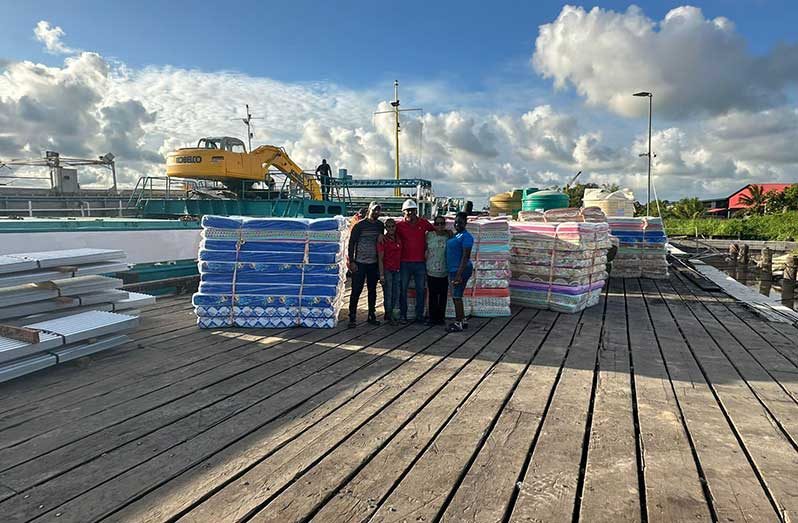HURRICANE Beryl’s devastation in St. Vincent and the Grenadines and Grenada highlights the urgent need for timely assistance and capital investment in Small Island Developing States.
In a joint press conference facilitated by the United Nations on Thursday, St. Vincent and the Grenadines’ Prime Minister, Dr. Ralph Gonsalves, and Grenada’s Prime Minister Dickon Mitchell voiced a collective call, highlighting the importance of funding to address the climate crisis and rebuilding efforts.
Beryl set a record for the first-ever Category 4 storm in June in the Atlantic, making landfall last week on Carriacou, in Grenada, and wrecking nearby islands.
St. Vincent and the Grenadines, Jamaica, Barbados, and St. Lucia were among some of the Caribbean States that were affected during Beryl’s passage across the region.
Thousands of people across Grenada and St. Vincent and the Grenadines were left homeless by the storm, which killed at least seven people, and destroyed schools, businesses and crops.
“Together, they constitute Beryl’s Armageddon,” said Prime Minister Gonsalves, who emphasised that “In just a few hours, entire islands were decimated.”
“Across St. Vincent and the Grenadines, the faces of men, women and children are strained and anxious. They are apprehensive. My country has had four significant disasters or emergencies since 2020 ‘COVID’… There were 21 volcanic eruptions; there was Hurricane Elsa, and then now a Category Four hurricane,” Prime Minister Gonsalves added.
The Prime Minister emphasised the devastating impact of recent natural disasters on St. Vincent and the Grenadines, highlighting the need for international assistance to address the country’s limited fiscal means.
Gonsalves made a request for substantial international assistance for relief, income support, production support, and rebuilding efforts.
He further urged major emitter countries to take climate change more seriously, and summon the political will to address it urgently.
Ideally, leaders are hoping to muster at least $9 million in assistance from the international community.
In an effort to assist 43,000 people, the United Nations joined the call for assistance, stating that $5 million of the $9 million sought will go to Grenada, and the remaining amount to St. Vincent and the Grenadines.
Grenada has recorded devastating damage, and while there is optimism to rebuild, tremendous financial aid is required.
“90 per cent of all buildings in these islands were destroyed: Homes, schools, commercial buildings, shops, airport, food facilities, marinas gas station, hospital health centres, community centres the road infrastructure, the shoreline, the coastline,” Grenada’s Prime Minister said.
The island’s entire economic sectors, he said, has grounded to zero.
Last week, the UN’s Secretary-General reiterated his solidarity with countries affected by Hurricane Beryl, releasing US$4 million from the organisation’s emergency response fund to kickstart relief efforts.
UN Secretary-General António Guterres expressed his deep dismay at the destruction caused by the hurricane, reiterating his solidarity with affected nations.
REGIONAL SUPPORT
In an immediate response, the Community (CARICOM) has been rounding up support for those nations that have been affected.
Guyana’s President and the current CARICOM Chair, President Dr. Irfaan Ali has since initiated a regional agriculture assessment to determine the damage of the regions agriculture and food production sector.
“The initial assessment is heart-wrenching to our farmers, to our government and to the people of these countries. It is heart-wrenching because of the tremendous investment, policy commitment and budget support that was placed in the agriculture sector since 2020,” Dr. Ali, who is also the lead Head of Government with responsibility for agriculture, agricultural diversification and food security in the region’s Quasi Cabinet said earlier this week.
According to President Ali, there have been investments in the sectors — infrastructure, water system, technology, crop variety, farm support, farm to market infrastructure; however, many of the states would have lost these investments.
Collectively, the regional bloc was aiming to slash their import expenditure on food by 25 per cent by 2025.
This vision has since suffered a setback.
President Ali explained that while the ‘quick fix’ will be to get food immediately to the islands that have been severely affected, a major concern will be ensuring that nutritional values are met.
On Thursday, a vessel from Guyana arrived in St. Vincent and the Grenadines with relief supplies. Similar support has also been given to Grenada.












